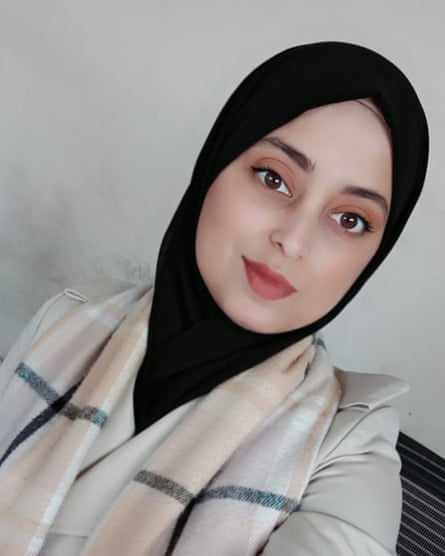On 6 October, Noor Hammad went to work as usual at a clinic in Deir al-Balah, central Gaza, where she was employed as a nutritionist. In the evening she made dinner for herself and her husband. They were planning for the birth of their first child in January and had been decorating a bedroom in readiness for her arrival.
The bedroom no longer exists. Their house was destroyed in airstrikes just days after the couple fled to the south of Gaza on 9 October.
Hammad is now living in her sister’s two-bedroom home in Khan Younis, where she sleeps on the floor with 25 other members of her family.
Excited anticipation over the arrival of her baby has been replaced with anxiety about her safety, the health of the unborn child and how she will give birth in a war zone.
“I have no idea where I will give birth to my daughter and how I will receive her without shelter or clothes,” she says. “I don’t have anything.”
Hammad, 24, is one of an estimated 50,000 pregnant women in Gaza facing an uncertain birth.
The UN Children’s Fund (Unicef); the UN Population Fund (UNFPA); the World Health Organization and other agencies said at the weekend that with 14 of the 35 hospitals and 46 of 72 health centres destroyed or no longer functioning, 180 women a day were giving birth without adequate care, including undergoing caesareans without painkillers, and being discharged, still bleeding, within hours of the delivery.

In a joint statement, they warned: “Some women are having to give birth in shelters, in their homes, in the streets amid rubble, or in overwhelmed healthcare facilities, where sanitation is worsening, and the risk of infection and medical complications is on the rise.”
Those medical facilities that remain open are overwhelmed with people wounded in airstrikes. “Maternal deaths are expected to increase, given the lack of access to adequate care,” the agencies said.
“The psychological toll of the hostilities also has direct – and sometimes deadly – consequences on reproductive health, including a rise in stress-induced miscarriages, still births and premature births,” they said.
Dr Zaher Sahloul, president of the aid group MedGlobal, says: “As hospitals turn off the last of their equipment due to lack of fuel, neonatal wards are falling dark, and newborns and mothers are suffering. These are among the saddest, yet easily preventable, tragedies.”
Hammad has witnessed the daily chaos facing healthcare workers while volunteering at Gaza’s Nasser hospital. “Injuries are being treated in the hospital courtyards and corridors,” she says.
“Complete surgical operations are performed without sterilisation or anaesthesia. The scenes are very difficult but this is the least I can offer my countrymen.”
The hospital is so overwhelmed that she has been unable to see a doctor to check on the health of her baby, and believes there is little likelihood of giving birth there or at any other health facility.
“I am not ready at all to give birth because hospitals at the present time do not receive cases similar to mine due to the number of injuries [they are dealing with].”
In the meantime, Hammad walks to a centre of the UN’s aid agency for Palestinian refugees (UNRWA) two or three times a week to collect tinned food and drinking water. The food is nowhere near enough for the 25 members of her family and she worries that the poor nutrition and polluted or salty water will harm her unborn child.
“I eat some foodstuffs with preservatives added to them that harm my health and the health of my foetus,” she says. “My health and psychological condition are not good.
“I cannot describe the extent of my suffering; all of our dreams have been destroyed. I hope this war will end and I can give birth to my daughter in peace.”
